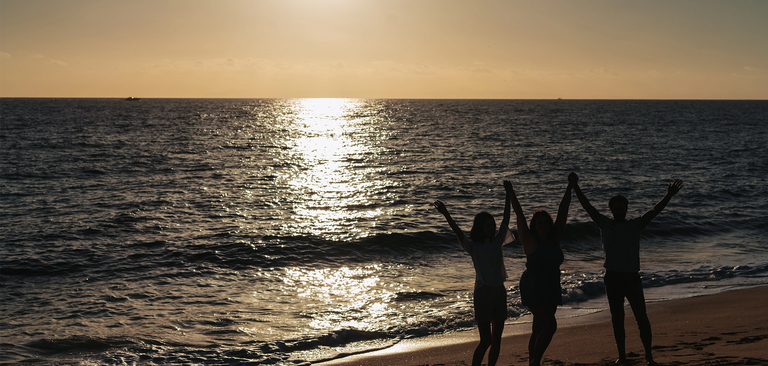Healthy, abundant oceans aren’t only beautiful, they are necessary for our survival. Our oceans cover more than half of the Earth’s surface and without them, life wouldn’t be the same.

The ocean produces half of the oxygen we breathe
Scientists say that about half of the oxygen produced on Earth comes from our oceans. Of that, 30% of the oxygen is produced by plankton, which is a name for any ocean organism that is a “drifter” carried along by tides and currents. These plankton include plants, algae, and some bacteria. A full 20% of the oxygen in the atmosphere comes from one particular species of ocean bacteria, Prochlorococcus, which was discovered in 1988. That means that one in every five breaths we take is thanks to this recently-identified species!
How do Prochlorococcus and other ocean organisms create oxygen? Through the same method as land-based oxygen producers: photosynthesis. Through this process, organisms like plankton use carbon dioxide, water, and energy from the sun to make food for themselves. During this transformation, oxygen is released.
Since energy from the sun is a vital part of photosynthesis, marine photosynthesizers have to live where the sunlight can reach them. This is an area of the ocean known as the photic zone. We used to think this zone only extended down to about 656 feet, but scientists have now discovered that some red algae living at 886 feet are also photosynthesizers. Our oceans and their abundant life continue to surprise us.

The ocean keeps Earth’s climate habitable
The ocean influences our weather and climate in several ways, helping to keep our planet one that is friendly to life. It does this by absorbing most of the sun’s radiation that reaches earth. The ocean stores that heat and then slowly releases it over many months or years. This not only helps to keep our planet warm and habitable, but it also impacts weather patterns around the globe. Here are some details:
- The stored heat helps with evaporation, which is a process by which water molecules transform into gas. Evaporation increases the temperature and humidity of our air and eventually leads to the creation of rain clouds. Almost all rain begins in the ocean thanks to this process.
- Ocean currents transport warm water and precipitation (any liquid or frozen water like rain, sleet, or snow) from the equator toward the north and south poles, and also move cold water from the poles back to the tropical areas around the equator. Without this process, regional temperatures would be extreme. We would have frigidly cold weather as we moved toward our poles, and blistering hot weather near the equator. Much less of our planet would be habitable.
The ocean offers us a biodiversity of nutritious and delicious food
The diverse marine habitats that exist around the world support between 500,000 and 10 million different species. Many of these species in turn support us as nutritious sources of food. This includes fish rich in protein and EPA and DHA omega-3s like Wild Planet’s canned tuna. It also includes creatures such as mussels, sea urchins, octopus, and species lower on the food chain like sardines, anchovies, and mackerel.
To sustain and protect this biodiversity, it’s important to practice only sustainable fishing. A good example of this is by using 100% pole & line catch methods without the use of nets to harvest tuna. This method allows fishermen to catch only targeted tuna species at a rate that allows the stock to naturally repopulate. This helps to ensure that no species reach dangerously low levels, and also avoids nontargeted sea creatures getting accidentally caught and wasted. With this sustainable fishing method, all targeted species which are caught are wisely and gratefully used for food.

The ocean provides meals to billions of people around the world
More than 3 billion people rely on seafood to provide almost 20% of the animal protein nutrition they need. That’s almost half of the world’s population. This makes our oceans essential for combating food scarcity, which is another reason that sustainable fishing is so important. As long as we all harvest and shop with an eye on sustainability, this resource will be one that we can rely on for generations to come.

How we can help protect our oceans
With these incredible gifts, it’s no wonder more consumers are becoming focused on ocean protection and ocean sustainability now more than ever. We can all help our oceans in a number of ways, including:
- Supporting sustainable fishing
- Eating sustainably caught seafood
- Consuming what our oceans plentifully provide, including species lower on the food chain
- Participating in cleaning up local coastal areas, lakes, and rivers
- Avoiding the use of herbicides, pesticides, and chemical fertilizers that can enter our waterways and ultimately damage our oceans
- Supporting companies, like Wild Planet, that focus on sustainability, biodiversity, and conservation
No action is too small to make a difference. Together, we can protect and reinvigorate our wild, abundant oceans on our one wild planet.
Sources:
- https://oceanservice.noaa.gov/facts/ocean-oxygen.html
- https://oceanservice.noaa.gov/facts/plankton.html
- https://ocean.si.edu/ocean-life/plankton/every-breath-you-take-thank-ocean
- https://oceanexplorer.noaa.gov/facts/climate.html
- https://education.nationalgeographic.org/resource/precipitation
- https://www.cbd.int/article/exploring-linkages-between-ocean-biodiversity-8June2022
- https://www.nature.org/en-us/what-we-do/our-priorities/provide-food-and-water-sustainably/food-and-water-stories/global-fisheries/
- https://www.worldwildlife.org/industries/sustainable-seafood#:~:text=3%20billion,significant%20source%20of%20animal%20protein
-
https://www.census.gov/popclock/









